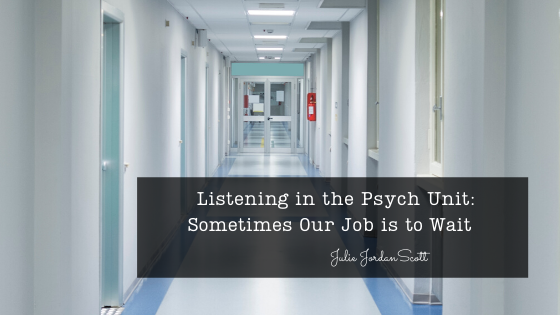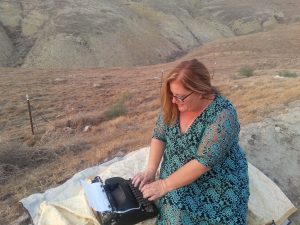
I can still feel it, the cold on my bottom, the slight pain from sitting on the linoleum floor at the psych unit at our county hospital. I was visiting a client, a conservatee, someone who had been deemed by the court “gravely disabled”. Gravely disabled is a legal term which meant they were granted me as a Deputy Conservator after a court process that repeatedly proven the individual needs substantial help for their care and treatment and they were unable to voluntarily accept help. The legal mandate may have changed int he last two decades, but then – when I sat on that linoleum floor – I was the person who was delegated to make choices regarding where certain people with mental illness would live, what medications they would have to take, what doctors they would see and what case managers would be responsible for their mental health treatment.
In this situation, the woman I was visiting was a favorite woman of mine – one I felt a certain kinship with even though she often had select mutism and didn’t do much talking. Sometimes she also refused to eat the food that was offered her, which was why she found herself lying in a hospital bed with me silently sitting on the floor beside her.
Maybe I could understand this because sometimes I had a difficult time responding when people asked me questions I didn’t want to answer. Maybe having a brother who was for the most part non-verbal had something to do with it. I wasn’t sure, but I knew there was nowhere else in the world I wanted to be on that afternoon.
It might sound completely contrary: sitting cross-legged on the floor next to her bed in a locked psychiatric unit is not a particularly happy place to be, especially with nothing being said.
She knew I was there. I knew she knew and still we sat, silently.
I thought if I just sat without nagging her incessantly she might open up to me.
Which is exactly what she did.
She brought forward numerous stories about numerous people in her history. I agreed with all of it because who was I not to? I didn’t know what happened in Little Italy in 1960. I wasn’t born yet.
We bonded that afternoon like no one else who worked for the county ever had. Thenext time I went to a meeting about her care, I told a case manager and a supervisor if they didn’t stop their bickering about my client’s care and treatment I would find someone else who would do the job instead.
No one had heard a Deputy Conservator talk that way before. I was over the pettiness and I wanted better for this woman and together, we did get better.
Why?
Because I sat on the floor next to her bed and didn’t expect anything from her. I just sat there, my willingness to listen reflected in my cold bottom and my extreme, quiet tenacity.
Ever since that day I have longed for someone to do the same for me.
Who do I know who will sit on their ass on a linoleum floor without nagging me, just being with me?
I realize as I re-read this that I wrote yesterday, my time in the hospital showed me people who would sit with me. They oftentimes talked more than I thought necessary but that’s because most people who show up at a hospital are there out of kindness and want to make things better.
Most people think better includes talking. To me, better means being present without talking.
I also found other people who would sit with me after I got out of the hospital.
All people who visited me and sat with me are treasured.
I share gratitude for them all, even those who wanted to visit and couldn’t due to schedules or discomfort or many other factors.
When my brother John was in the process of dying, I would visit him in the hospital for hours at a time. He literally could not speak because he was intubated. He was not very verbal ever in his life so we had a very quiet, reflective relationship.
I loved sitting beside him silently. It was more than enough to be there, honoring him.
It is more than enough to bravely tell people we don’t know what to say or what to do and we want to be present for them, to listen without advice, to silently be there – presence being the ultimate purpose.
I saw my client’s obituary in the local newspaper several years after I stopped working at the county. I cried as I read it. As I finished writing this article, I listened to my memory to remember her name. I knew her first name and could easily bring up other women with her same first name, even one client who I worked with nearly forty years ago.
My brain brought her surname to life and I spoke her name aloud, a smile and a laugh following. She is still alive in my memory for the lessons she taught me and so much more. Some of the secret stories she shared I have never spoken to anyone else.
They will always be safe with me, my friend. I waited until you were ready and then I heard you.

Julie JordanScott is the Creative Life Midwife. She inspires people to live their life as an artform and take action towards their best results. During the 2020 Pandemic she is also leading daily Virtual Coffee Dates, Facilitating Intentional Conversation so people will feel less isolated during this time of social and physical distancing. Join the conversation by registering for free by clicking this link.